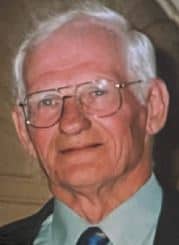Joe Cox died on 4th December 2021.

He joined the 7th Hussars whilst they were serving in Hong Kong during their tour in 1954-57. There Joe served in the Orderly Room where he was to spend most of his early career spanning Tidworth where the amalgamation with the 3rd Hussars took place, Munster and Detmold.
In 1965 the regiment moved to Catterick with an independent ‘A’ Squadron in Berlin. Joe was selected for the important role of Chief Clerk of the independent squadron until the regiment was reunited at Maresfield.
There he became the Chief Clerk of the regiment. This was a challenging role as six months later the regiment was split with RHQ, ‘A’ and ‘C’ Squadrons in Aden, ‘B’ Squadron in Sharjah and a rear party in Maresfield.
Joe earned a reputation for being highly efficient and always helpful. When in need of additional clerks Joe would visit the tank park on a particularly cold morning and suggest to those whom he deemed suitable that they might prefer life in the warmth of the Orderly Room.
In 1968 Joe was posted to the RAC Centre, initially at Bovington and then at Lulworth before returning to regimental duty in 1973.
Joe was marked out for promotion to Warrant Officer but he lacked a qualification which was required for him to hold that rank as Chief Clerk.
Such was the esteem in which Joe was held, he was transferred to the QM (Tech) department where the RQMS(T) appointment was exempt from such qualifications. This was unfamiliar territory for Joe but his dedication and efficiency saw him promoted to S/Sgt. and then to RQMS(T) within two years.
In 1976 Joe was posted to RAC Records Office at Whetstone, Mill Hill. This office ran the administration and career management of all Royal Armoured Corps soldiers. From there Joe left the army to live in Dorset and joined some fellow ex- QOH at the Atomic Energy Establishment at Winfrith.
In 1993 Joe became secretary of the QRH Wool Troop where his first task was to merge the old QOH and QRIH troops. Joe ran this troop of four hundred members with his usual efficiency and its success is a testament to Joe’s drive and dedication.
Joe was born in Hullavington, Wiltshire and was always a countryman at heart. In 1996 he offered his services as gamekeeper to the Lulworth shoot to Lt Col Kestrel Simpson who was commandant at the time and who was keen to revive the shoot which had become very run down.
For ten years until his knees no longer allowed him to walk the ranges Joe drove over from Tolpuddle every evening after the firing had ended to feed and care for the birds. This was a labour of love that he undertook without payment or even expenses.
He somehow always managed to produce a team of beaters who were also unpaid and the shoot under his management became hugely successful and popular.


